While watching Woody Allen's Radio Days, in spite of the language being English, I found myself increasingly unable to relate to the American radio scene of 1930s & 1940s. All I could map on to were the songs I used to record on to an Audio cassette from Akashvani) radio during my school days & with the ascent of Satellite TV (M TV, Channel V), the custom-made cassettes that I got recorded by paying Rs. 60 per cassette to 'Magnum Audio' consisting of songs from America to Caribbean to Indipop to Bollywood to Raja-Rahman and the like. Back to 'Radio Days' – it used to intrigue me that for all the Hollywood & World Cinema which we consume with the advent of TV & Torrents, not many succeed in transporting us wholly to the socio-political status of the respective community, based on which the film was made. Most of us also are happy to be convinced just by the outer layer, the music-cinematography-art direction-screenplay-visual effects-acting without going into the scenario under which the movie was made. For instance, the film Madras, which is rich in subtext & political commentary, will not be able to make sense to a Movie buff from Brazil who sees it with subtitles. In fact why Brazil, I am not sure even if a film buff from Kerala will be able to appreciate the Dalit-politics undercurrent. Talking of Brazil, let us take a popular Brazilian film that most of the movie-freaks influenced by IMDb Top 250 would have watched – City of God. The protagonist is named Buscape and in the subtitle it reads as Rocket. But I came across online that the word actually means one who can run fast in spite of any barriers. However, the usage of a template word "Rocket" in the subtitles literally carries nothing across to us. This is a very trivial example in the context of what we are losing due to different languages & dialects. But I hope you understand where I'm getting to.
Pausing here & moving on to talk about a movie that had me gawking all over it – Premam! That the film happens over three specific timelines in the protagonist George's life IS evident from the poster itself. While people call it Alphonse Putharen's Autograph, I would rather call it Alphonse Putharen's Attakathi. Of course, Attakathi is more grounded & ends in a comical note of how the protagonist is a failure in love all throughout; however Premam sort of tries to end on a more positive note of the hero becoming more responsible. I personally like both the films but what makes Premam more enticing to the general public is that the protagonist moves from cute to macho-cute to responsible-cute over his three sojourns. In Attakathi though, the character oscillates between blatant stalking/gloating and macho-ism! This is in spite of the fact that Premam has smoking/drinking scenes aplenty when compared to Attakathi where the protagonist is more docile & even parent-fearing.
Back to Premam. The protagonist George's first attempt at wooing a girl happens at school & it is roughly 25% of the movie's runtime. While the whole chapter is cute & inventively made, it is nothing unheard of or unseen ever on film. Moving on to the second girl in George's life, Malar – which on first look – seems to be a teacher-taming-a-wild-student template love occupying 50% of the runtime. But that's where the magic commences. It starts from the introduction through the spine-tingling Kalippu song where Veshti is symbolically made to represent a Weapon of Mass Destruction (Guess it's time Sarath Kumar & Mohanlal moved over to let these guys take on those Veshti ads). Then we get to the second heroine, Malar who is extremely pleasant to look at with those pimples that have been intentionally left on (there is even a dialogue that ensures audience doesn't miss out noticing it), but there is nothing cinematic about her. She has a Shakthisree Gopalan like voice, talks & dresses normally, but there is something magnetic about her & the pairing with George, so much so that I was ready to exit the theatre the moment she left the college after the stage performance, because of the knowledge that there is going to be another girl in the life of George. We have a staple comedy track where a Computer Science teacher who is partially bald, also woos her & a PT master friend helps (actually hinders) him. A fabulously picturized duet song rendered by Vijay Yesudas makes us fall in love with melodies again. This love segment ends abruptly and even predictably followed by the unveiling of another girl as we get to the next episode in George's life. You have got to give it to Alphonse for pulling the rug from below, with respect to who this third girl is. However, in spite of the best efforts of the third girl in his life – Celine, the lovely bakery atmosphere that allows exquisite food photography, quirky supporting characters and even the director himself in a cameo taking a royal beating at the hands of the protagonist, nothing was enough to bring me out of the 'Malar' hangover. As I set about analyzing it, I found that Malar speaks very less in the film (probably one page of dialogue at the max); she dances not to the duet but to a striking Kuthu number voiced by Anirudh; she wears clothes that are very subdued in color as well as style; she even has very minimal intimate moments with George. Then how is that part of the story & that girl so alluring to so many who have seen the movie. While infatuation towards a teacher at High School or college level is natural for teenagers, something makes this seem very sacred & special. I place my bets on cinematic techniques – the apt framing with perfect focus and the right music! I mean what else can it be attributed to?! You cannot say that the writing is extraordinary or the characterization has tremendous depth. Premam is quite simply an enthralling amalgamation of cinematic techniques that succeed in gracefully manipulating the emotions of the audience!
The one grouse I have with Premam is being unable to relate to it at a ground level that a movie-freak from Kerala would easily be able to. I read online that the film pays tributes to certain dialogues from classic Malayalam movies like Thoovanathumbikal, Namukku Parkkan Munthiri Thoppukal, and Manichitrathazhu, but I couldn't spot any. It is similar to what people outside of Tamilnadu would have felt when watching that pivotal scene in Jigarthanda when Karthik says he is a filmmaker who makes feature films like Dhalapathy & Nayagan, when Ilayaraja's masterful Dhalapathy BGM starts playing as 'Assault' Sethu reacts. The only local reference I could catch in Premam was when they talk about age difference between couples for marriage and the recent union of Fahadh & Nazriya gets quoted. In addition to these, there were many labels inscribed on screen in Malayalam which the subtitle could not cover. Of course, I mostly get the response that one can UNDERSTAND the films across most South Indian languages, but I always retort saying understanding is never the question, it's absorbing each & every nuance/subtext that the filmmaker has embedded in his work, which I consider to be the duty of any true film-buff.
In reality, I am aware that this is an insurmountable hurdle. Cultural & linguistic nuances will certainly be lost in literal translation. This is one of the precise reasons why I often feel envious of folks who know many languages. The conversation with such people goes like, "How many languages can you speak & understand?" and promptly the reply comes as, "Yeah. I know Hindi, Telugu & of course English". I am like, "Awesome! You get to watch & absorb movies from 3 languages! Blessed you are, man". Call me short-sighted for measuring (or some might even say demeaning) a polyglot by exclaiming at the amount of movies he/she gets to absorb. But hey, I request you to excuse me – I am humble movie-buff after all!
Column written by Anand Sethuraman.

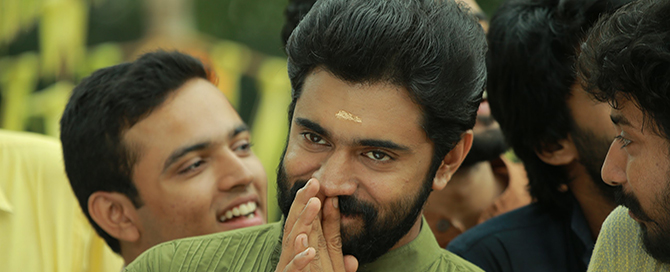
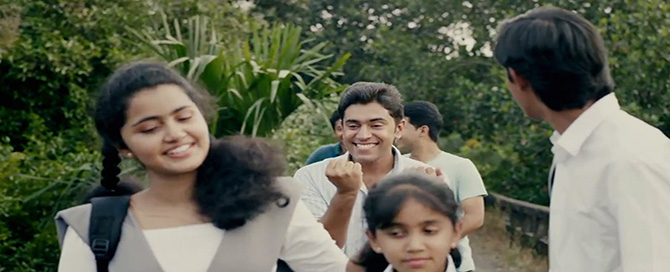

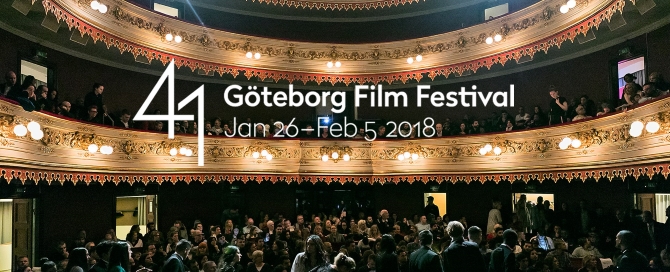
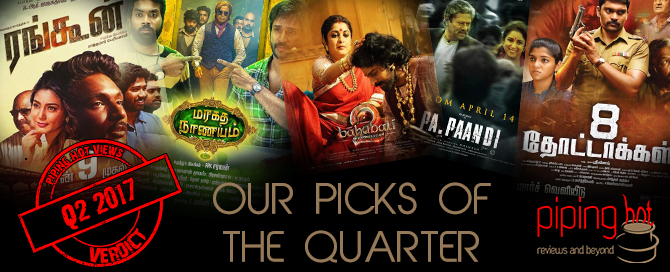
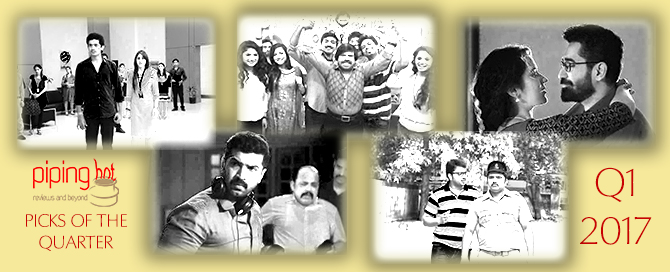
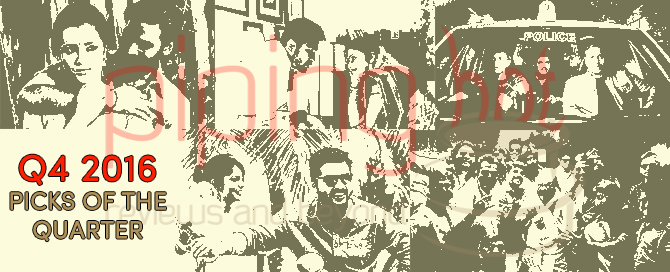
From the heart write-up
Here are some scenes/trivia I could find
— When Celine walks into the Cafe, Jojo asks her to be careful not to slip on the floor by saying “Vellam, vellam”(starts around 1:47:00) https://www.youtube.com/watch?v=F0P1RzIlRMM
— When george saying he wants to buy tamil DVDs to learn Tamil, the gang teases him with the dialogue “Velakkariyanalum nee en mohavalli” – https://youtu.be/CBGgCB31EsU (starts at 1:32:32)
— Ranji Panicker, who acts as Georges dad, blasts the principal in English, much like the heroes of his movies (mostly Suresh Gopi) from the late nineties. Ranji used to be known for his police / political movies and scripts.
— Thoovanathumbikal and namikku paarkaan… are padmarajan cult films and you can see George trying to pick up few dialogues for proposing to Mary, and the friends convincing him to be himself and doint spoil the occation:)
— During the song Scene Kontra, Shabarish Varma, who plays Shambhu (also the lyrisist for all songs) asks Jojo for Kattan Kappi (black coffee) – referring to a short film made by the gang starring Jojo as lead https://www.youtube.com/watch?
v=URj-ayii6sI
— Last scene where Ronnie(Alphons) gets royal beating from George and gang, Shabarish blames him for imposing a rule to arrest people who wear Bob Markey T shirt (http://www.firstpost.com/living/kerala-police-crack-why-teenagers-do-drugs-blame-bob-marley-1434353.html)